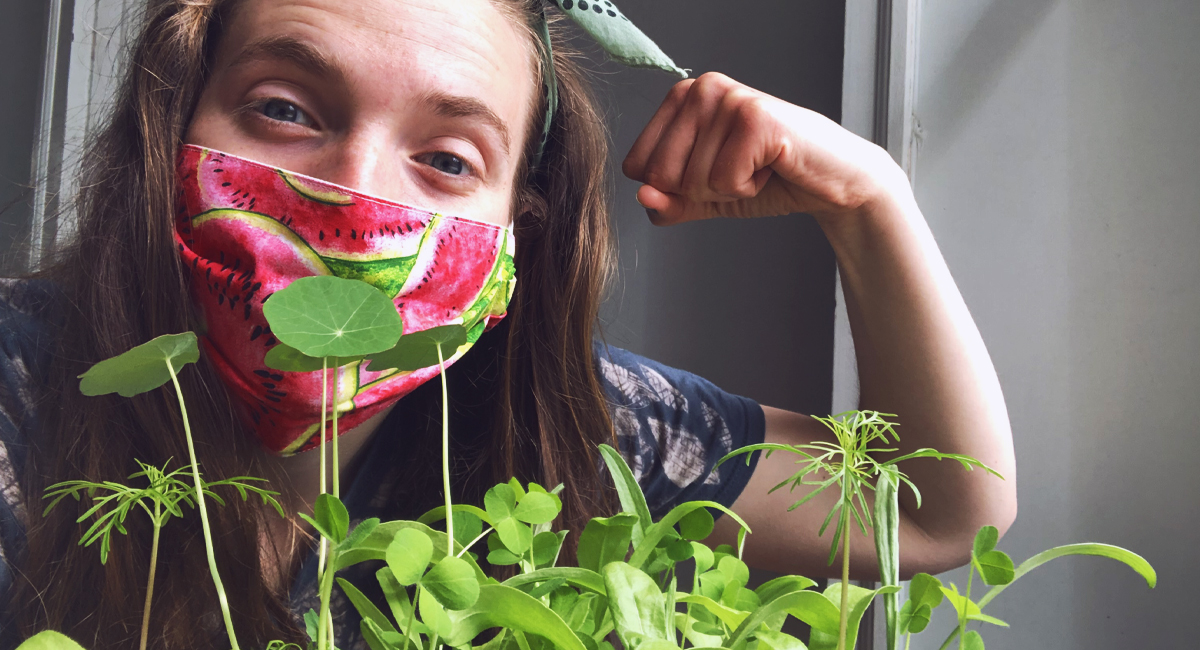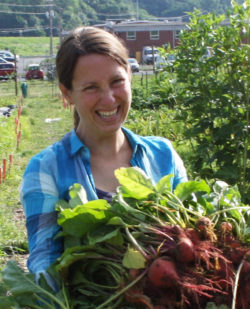
As part of Shaver’s Creek’s Human Nature Series, we work to bridge the gap between the natural world and our health through a series of public workshops. To continue these conversations, we’re providing more information and resources in our Naturalist Notebook!
“Dig on for Victory!” “Food is ammunition — don’t waste it!” These, among many other phrases, spurred a new generation of gardeners during World War II. All in the name of patriotism, victory gardens were in vogue as a way to support the war effort. Shortages in labor and transportation made it difficult for fresh produce to make it to the national market. In addition, staples like sugar, butter, milk, and coffee were rationed. Fast forward to 2020; many of us are again turning to more self-sustainable forms of acquiring food as medical professionals are on the front lines and grocery stores face food shortages. We are inspired by your curiosity and interest in gardening! Getting started can be intimidating, so here are some things to keep in mind and know as you embark on your journey of growth!
We have gathered some advice and expertise from 4 garden gurus on several questions that you might be asking yourself as you start to create your garden. Our gurus are: Angela Corcoran, an AmeriCorps member with the Penn State Sustainable Food Systems program; Maggie Peacock, a Penn State Master Gardener; Leslie Pillen, director of the Penn State Sustainable Food Systems Program through the Student Farm; and Dr. Elsa Sánchez, a scientist and professor of Horticultural Systems Management.
I’m just starting out. What are some things to keep in mind as I am planning?
Elsa: Keep in mind that a garden needs to be maintained all season long. Liberty Hyde Bailey says, “A garden requires patient labor and attention. Plants do not grow merely to satisfy ambitions or to fulfill good intentions. They thrive because someone expended effort on them.” It’s better to start a small garden that you can maintain.
Angela: Site is everything! Make sure to pick a spot that gets consistent sunlight (8–10 hours is ideal, but 6 hours is sufficient)! I recommend spending 10–20 minutes a day to get to know the pests and weeds. Compost tea or fish emulsion regularly, once a week or biweekly, especially if it’s a new site. I like Neptune’s Harvest Fish & Seaweed Fertilizer. Using mulch can also be a great way to reduce the need to water.
Leslie: Transplants can be a great way to get a head start on weeds and help you get your spacing right, rather than direct seeding. I like to prep new areas by digging up what is growing there and turning it over and then covering it with a tarp to block sun and rain. I recommend these two sites for durable, ergonomic tools that will last you a lifetime: Howland Tools and Earth Tools.
Maggie: Just dig in! Start with a few things and expand as you continue to grow through the years. Use pots if you don’t have a lot of space. Raised beds are also easy to construct, and there is less soil compaction (since you’re not walking on the soil) which is good for your plants and their roots! You’ll be amazed what you can grow in a small space!
What crops are good to grow in Centre County?
Angela: I really believe you should grow what you like to eat! You can start with kale, a cut-and-come-again spring mix, herbs, flowers (zinnias and cosmos are gorgeous and easy to grow), tomatoes, and peppers, then move on to ‘pickier’ crops like cabbage and broccoli.
Elsa: Like Angela said, grow what you like to eat! Many people love growing tomatoes; but don’t grow them if you don’t like them. Grow whatever you and your family will eat.
Maggie: I recommend getting a soil analysis through PSU since some plants do better in certain kinds of soil. In my experience, I’ve had luck with tomatoes, green beans, basil, lettuce, kale, and other greens. You can always ask a neighbor too; what works for them will probably work for you.
Leslie: A diversity of annual veggie crops grow well here. One crop that works for me is red raspberries. There’s nothing like fresh raspberries!
What crops will grow well together?
Maggie: Crops that grow well together are called companion plants. Onions and Carrots are good companion plants. Onions repel carrot fly and aphids. Corn and pole beans go well too. Plants that attract similar pests should be spread out. Some plants also produce compounds that others do not like. For example, coriander and dill produce compounds that can harm carrots.
Angela: Check out this companion planting guide from one of my favorite seed companies, Fruition Seeds!
Elsa: I like to group vegetables by the family they are in: tomatoes, peppers, and eggplants together; cucumbers and zucchinis together; and onions and leeks together, for example. Then we rotate their location from year to year to prevent disease and pest build-up.
Leslie: Tomatoes and basil tend to grow well together, and they eat well together, too! Try a fresh heirloom tomato slice (Cherokee Purple is a good cultivar) with a just-picked Genovese basil leaf, some fresh mozzarella, a drizzle of olive oil and balsamic, and a light sprinkle of kosher salt.
Where can I find resources right now? Are there local places I can support?
Leslie: Several local farmers’ markets are open this season and some bring seedlings for purchase. I like buying from Pinetree Garden Seeds and Johnny’s. If you store seeds in a cool, dark, rodent-free location, most seeds should be good for several years.
Maggie: We’re fortunate to have the Penn State Extension Master Gardeners of Centre County here in our backyard. Here are some written publications that are helpful for budding gardeners. They are also creating an 8-part webinar series called “Victory Gardens Reinvented,” You can access new or old episodes. Feel free to email their hotline with any questions at centremg@psu.edu!
Angela: Most seed companies have reopened. A great local nursery is Patchwork Farms — they have vegetable seedlings!
Elsa: We are planting some new asparagus crowns from Nourse Farms. We also put some landscape fabric from Johnny Seeds on the ground (to help manage weeds). These are just two of many reputable companies selling online. Ask your neighbors, too! Mint, rosemary, and lavender are easy to propagate from cuttings. Rhubarb and chives can be divided to start new plants. Recently, we divided our lovage plant to happily share with our neighbors.
Any other words of wisdom from an experienced gardener?
Elsa: Make sure to have a weed-management plan. We use landscape fabric to minimize the effort we have to put in to weeding. Mulches (a thick layer of 4–6 inches) of organic material can help suppress weeds as well. Check out Penn State Extension for gardening information and their publication “Vegetable Gardening.”
Leslie: Keep a notebook to jot down observations (what grows well, what you liked and didn’t like, etc.). You think you’ll remember everything the next season, but when I read through my notes, there are plenty of things I forgot.
Maggie: Keep a journal. I also recommend keeping a bug jar. Instead of pesticides, you can pick little critters off your plants, keeping you and your plants healthy. Growing your own food is so rewarding. Have fun with it! Store-bought veggies won’t even compare to your homegrown ones.
Angela: The best gardeners are curious gardeners! Have fun and enjoy the process!
Get to Know our Garden Gurus!
Dr. Elsa Sánchez
Elsa Sánchez is a scientist who studies vegetables at Penn State. She teaches classes including Vegetable Crops and Hydroponics and Aquaponics and conducts research on new ideas and issues vegetable farmers face.
Leslie Pillen
Leslie Pillen directs the Sustainable Food Systems Program through the Student Farm at Penn State, community partnerships, a new Food Systems minor, and Student Farm Club. She earned a B.S. in Horticulture from the University of Nebraska-Lincoln and received her M.S. in Rural Sociology from Penn State in December 2013.
Maggie Peacock
Maggie Peacock is a 25-year resident of State College, PA who recently became certified as a Master Gardener through Penn State — the Penn State Master Gardener Program was established to help Cooperative Extension provide horticultural knowledge and skills to local communities and the gardening public. Maggie’s love of plants and gardening stems from helping with the family garden as a child, and she’s happy to be learning more every day and helping others get excited about it, too.
Angela Corcoran
Angela is passionate about supporting local food systems and making things grow! She has 5 years of experience working in various realms of agriculture, including insect ecology and population management research, market farming at a diversified veg & fruit farm, community engagement with the Penn State Student Farm & Sustainable Food Systems Program, and more recently, flower farming with a local cooperative.
